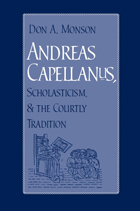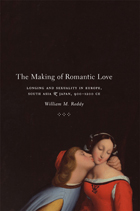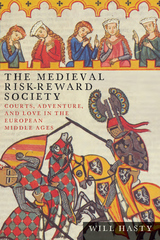3 books about Courtly love

Andreas Capellanus, Scholasticism, and the Courtly Tradition
Don A. Monson
Catholic University of America Press, 2005
This book, the first study in English devoted entirely to Andreas Capellanus's De Amore, presents a comprehensive inquiry into the influence of scholasticism on the structure and organization of the work, applying methods of medieval philosophy and intellectual history to an important problem in medieval literary studies.
[more]

The Making of Romantic Love
Longing and Sexuality in Europe, South Asia, and Japan, 900-1200 CE
William M. Reddy
University of Chicago Press, 2012
In the twelfth century, the Catholic Church attempted a thoroughgoing reform of marriage and sexual behavior aimed at eradicating sexual desire from Christian lives. Seeking a refuge from the very serious condemnations of the Church and relying on a courtly culture that was already preoccupied with honor and secrecy, European poets, romance writers, and lovers devised a vision of love as something quite different from desire. Romantic love was thus born as a movement of covert resistance.
In The Making of Romantic Love: Longing and Sexuality in Europe, South Asia, and Japan, William M. Reddy illuminates the birth of a cultural movement that managed to regulate selfish desire and render it innocent—or innocent enough. Reddy strikes out from this historical moment on an international exploration of love, contrasting the medieval development of romantic love in Europe with contemporaneous eastern traditions in Bengal and Orissa, and in Heian Japan from 900-1200 CE, where one finds no trace of an opposition between love and desire. In this comparative framework, Reddy tells an appealing tale about the rise and fall of various practices of longing, underscoring the uniqueness of the European concept of sexual desire.
[more]

The Medieval Risk-Reward Society
Courts, Adventure, and Love in the European Middle Ages
Will Hasty
The Ohio State University Press, 2016
The Medieval Risk-Reward Society offers a study of adventure and love in the European Middle Ages focused on the poetry of authors such as Marie de France, Chrétien de Troyes, Wolfram von Eschenbach, and Gottfried von Strassburg—showing how a society based on sacrifice becomes a society based on wagers and investments. Will Hasty’s sociological approach to medieval courtly literature, informed by the analytic tools of game theory, reveals the blossoming of a worldview in which outcomes are uncertain, such that the very self (of a character or an authorial persona) is contingent on success or failure in possessing the things it desires—and upon which its social identity and personal happiness depend. Drawing on a diverse selection of contrasting canonical works ranging from the Iliad to the biblical book of Joshua to High Medieval German political texts to the writings of Leibniz and Mark Twain, Hasty enables an appreciation of the distinctive contributions made in antiquity and the Middle Ages to the medieval emergence of a European society based on risks and rewards.
The Medieval Risk-Reward Society: Courts, Adventure, and Love in the European Middle Ages takes a descriptive approach to the competitions in religion, politics, and poetry that are constitutive of medieval culture. Culture is considered always to be happening, and to be happening on the cultural cutting edge as competitions for rewards involving the element of chance. This study finds adventure and love—the principal concerns of medieval European romance poetry—to be cultural game changers, and thereby endeavors to make a humanist contribution to the development of a cultural game theory.
The Medieval Risk-Reward Society: Courts, Adventure, and Love in the European Middle Ages takes a descriptive approach to the competitions in religion, politics, and poetry that are constitutive of medieval culture. Culture is considered always to be happening, and to be happening on the cultural cutting edge as competitions for rewards involving the element of chance. This study finds adventure and love—the principal concerns of medieval European romance poetry—to be cultural game changers, and thereby endeavors to make a humanist contribution to the development of a cultural game theory.
[more]
READERS
Browse our collection.
PUBLISHERS
See BiblioVault's publisher services.
STUDENT SERVICES
Files for college accessibility offices.
UChicago Accessibility Resources
home | accessibility | search | about | contact us
BiblioVault ® 2001 - 2024
The University of Chicago Press









